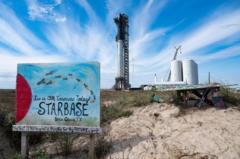In a historic move, the area encompassing Elon Musk's SpaceX headquarters near Boca Chica, Texas, has been officially designated as the city of Starbase. Following a local election where a significant majority of 212 out of 283 eligible voters, primarily SpaceX employees, voted in favor, Starbase has been formally established. Musk announced the news via social media, emphasizing the new city's status.
Starbase spans approximately 1.6 square miles (3.9 square km), previously a sparsely populated enclave before SpaceX began significant land acquisitions in 2012. The city's governance structure will feature a mayor and two commissioners who will oversee local governance matters, including urban planning and tax regulations. SpaceX executive Bobby Peden has been elected as the first mayor, alongside two other officials closely tied to the company.
Despite the excitement surrounding this new municipality, several local residents have voiced concern regarding SpaceX's environmental footprint. The integration of company facilities and housing into the area has led to allegations that SpaceX is damaging the local ecosystem. Environmental activists have pointed out the adverse impacts, including increased light pollution and debris from frequent rocket launches, asserting that the company poses a threat to wildlife.
The creation of Starbase will classify it as a Type C municipality, recognizing populations below 5,000, which allows city officials to impose a property tax of up to 1.5%. A proposed state bill currently under consideration could grant Starbase control over highway closures during rocket launches, a move met with opposition from Cameron County officials, who currently manage these operations.
As SpaceX aims to ramp up its launch frequency at the Texas site, from five to potentially 25 launches annually, disputes relating to access to local beaches and wildlife areas may intensify. The local government, advocating for community interests, is expected to maintain a tenuous balance against a powerful industry that significantly influences the region's economy.
In recent years, Musk has relocated many of his ventures from California to Texas, seeking a more favorable business climate, while raising concerns among environmental groups regarding the ecological sustainability of such rapid development. The ongoing challenges between local governance and corporate interests underline the complex dynamics of economic development, environmental stewardship, and community rights in a rapidly changing landscape.
Starbase spans approximately 1.6 square miles (3.9 square km), previously a sparsely populated enclave before SpaceX began significant land acquisitions in 2012. The city's governance structure will feature a mayor and two commissioners who will oversee local governance matters, including urban planning and tax regulations. SpaceX executive Bobby Peden has been elected as the first mayor, alongside two other officials closely tied to the company.
Despite the excitement surrounding this new municipality, several local residents have voiced concern regarding SpaceX's environmental footprint. The integration of company facilities and housing into the area has led to allegations that SpaceX is damaging the local ecosystem. Environmental activists have pointed out the adverse impacts, including increased light pollution and debris from frequent rocket launches, asserting that the company poses a threat to wildlife.
The creation of Starbase will classify it as a Type C municipality, recognizing populations below 5,000, which allows city officials to impose a property tax of up to 1.5%. A proposed state bill currently under consideration could grant Starbase control over highway closures during rocket launches, a move met with opposition from Cameron County officials, who currently manage these operations.
As SpaceX aims to ramp up its launch frequency at the Texas site, from five to potentially 25 launches annually, disputes relating to access to local beaches and wildlife areas may intensify. The local government, advocating for community interests, is expected to maintain a tenuous balance against a powerful industry that significantly influences the region's economy.
In recent years, Musk has relocated many of his ventures from California to Texas, seeking a more favorable business climate, while raising concerns among environmental groups regarding the ecological sustainability of such rapid development. The ongoing challenges between local governance and corporate interests underline the complex dynamics of economic development, environmental stewardship, and community rights in a rapidly changing landscape.



















